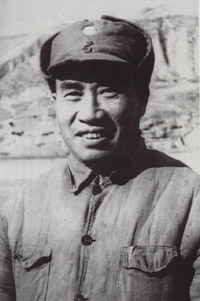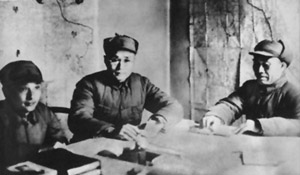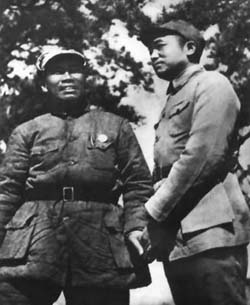CPC Heroes
Zhu De
(PLA Daily 2005-08-19/the National History Encyclopedia of the People's Republic of China)
Updated: 2010-09-30 10:42

Zhu De, born in Yilong County of Sichuan Province in 1886 and passed away in 1976, is a great Marxist, proletarian revolutionary, statesman and military strategist. He is one of the principal leaders of the Communist Party of China and the People's Republic of China and one of the founders of the Chinese People's Liberation Army.
Zhu De was enrolled into the Army School of Yunnan in 1909, and joined the Tong Meng Hui (Chinese Revolutionary League) the same year. He took part in the Revolution of 1911. Since 1913, he served as battalion commander, deputy regiment commander, regiment commander and brigade commander in the Yunnan Army in. In 1922, Zhu De left for Germany to study abroad where he joined the Communist Party of China in the same year. Then in 1925 he arrived in Soviet Union to study the military. The next year he returned to China and established the officer training regiment under the 3rd Corps of the National Revolutionary Army in Nanchang in 1927. Zhu De was one of the leaders of the "August 1st" Nanchang Uprising, holding the post of the deputy commander of the 9th Corps of the Uprising Army. In 1928 he participated in the leadership of the Southern Hunan Uprising and in April the same year, he led the uprising troops to the Jinggangshan Mountain to join forces with those led by Mao Zedong, establishing the 4th Corps of the Chinese Worker's and Peasant's Revolutionary Army( renamed the Chinese Workers' and Peasants' Red Army afterwards), assuming the office of the corps commander.
Since 1930, Zhu De served as commander of the 1st Army Group, commander-in-chief of the 1st Front Army and commander-in-chief of the Chinese Worker's and Peasant's Red Army and chairman of the Central Revolutionary Military Commission. Zhu De, together with Mao Zedong and Zhou Enlai, commanded the Red Army to triumph over four large-scale military encirclements and suppressions to the Central Revolutionary Base Areas launched by the Kuomintang forces. He took part in the Long March in October 1934. In January 1935, at the Zunyi Conference held by the CPC Central Committee, Zhu De solemnly criticized the error of the " Left adventurism", showed his complete support to Mao Zedong's leading position in the whole Party. During the Long March, he was strongly opposed to and carried out resolute struggle against the activities of breaking up the Red Army and betraying the Party done by Zhang Guotao.
When the War of Resistance Against Japanese Aggression broke out in 1937, Zhu De, who held the post of the commander-in- chief of the Eighth Route Army of the National Revolutionary Army (soon renamed the 18th Group Army of the National Revolutionary Army), led the Eighth Route Army to march to the anti-Japanese frontline in north China where they teamed up with the Kuomintang forces to fight against Japanese invasion troops. Under the right command of the Eighth Route Army Headquarters with Zhu De as the leader, the Eighth Route Army won victory one after another in battles in Pingxingguan and so on. Then he commanded the Eighth Route Army to penetrate deeply into the areas behind the enemy line where the Eighth Route Army troops carried out guerrilla warfare and built up and expanded many anti-Japanese base areas.
At this period of time, Zhu De, concurrently as commander-in-chief of the East Route Army of the 2nd War Zone and deputy commander of the 2nd War Zone, directed the Kuomintang troops under his command to join hands with the Eighth Route Army in fighting against Japanese invasion troops, which was conducive to the consolidation of the CPC-KMT cooperation in the war of anti-Japanese aggression. After returning to Yan'an in 1940, Zhu De put forward the " Nanniwan policy", which called on the military and civilian to launch a large-scale production campaign to break the KMT's economic blockade to the Shaanxi-Gansu-Ningxia Border Area. In 1945, Zhu De made a military report on "The Battlefields In The Liberated Areas" on the 7th CPC National Congress. On the 1st Plenary Meeting of the CPC 7th Central Committee he won an election for the membership of the Political Bureau and membership of the secretariat of the CPC Central Committee.
During the time of the Liberation War, Zhu De was the commander-in-chief of the Chinese People's Liberation Army (PLA). He made significant contributions to leading the PLA to overthrow the reactionary reign of KMT government and win the great victory of the Liberation War. After the founding the People's Republic of China (PRC), Zhu De had successively held the posts of vice chairman of the Central People's Government, vice chairman of the CPC Central Military Commission, commander-in-chief of the Chinese People's Liberation Army, vice president of the PRC and vice chairman of the National Defense Committee. From April, 1959, he had served as chairman of the Standing Committee of the 2nd , 3rd and 4th National People's Congress. In 1955, he was conferred the military rank of Marshal of the People's Republic of China. Zhu De was one of the most important members of the CPC's first generation of leading collective with Mao Zedong at the core.
|
 Zhu De, Liu Bochen(middle) and Deng Xiaoping(left) are studying oprational plans at the headquateres of the 129th Division in 1938. |
|
 Zhu De and Peng Dehuai(right) at the general headquarters of the Eighth Route Army in 1939 |
|
 Zhu De is making a military report themed "The Battlefields In The Liberated Areas" on the 7th CPC National Congress in 1944. |
 CPC Heroes
CPC Heroes
Zhu De
Zhu De, born in Yilong County of Sichuan Province in 1886 and passed away in 1976, is a great Marxist, proletarian revolutionary, statesman and military strategist.
Chen Yi
A native of Le Zhi, in Southwest China's Sichuan Province, and awarded by the People's Republic of China the military rank of marshal; Served as the country's Vice Premier (1954-1972) and Foreign Minister (1958-1972)

